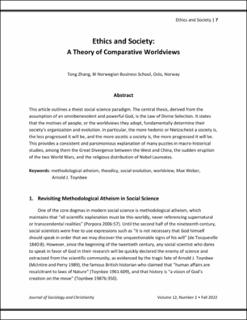Ethics and Society: A Theory of Comparative Worldviews
| dc.contributor.author | Zhang, Tong | |
| dc.date.accessioned | 2024-02-01T09:59:07Z | |
| dc.date.available | 2024-02-01T09:59:07Z | |
| dc.date.created | 2022-10-16T20:52:54Z | |
| dc.date.issued | 2022 | |
| dc.identifier.issn | 2572-4088 | |
| dc.identifier.uri | https://hdl.handle.net/11250/3115018 | |
| dc.description.abstract | This article outlines a theist social science paradigm. The central thesis, derived from the assumption of an omnibenevolent and powerful God, is the Law of Divine Selection. It states that the motives of people, or the worldviews they adopt, fundamentally determine their society’s organization and evolution. In particular, the more hedonic or Nietzscheist a society is, the less progressed it will be, and the more ascetic a society is, the more progressed it will be. This provides a consistent and parsimonious explanation of many puzzles in macro-historical studies, among them the Great Divergence between the West and China, the sudden eruption of the two World Wars, and the religious distribution of Nobel Laureates. | en_US |
| dc.language.iso | eng | en_US |
| dc.publisher | Christian Sociological Association | en_US |
| dc.title | Ethics and Society: A Theory of Comparative Worldviews | en_US |
| dc.title.alternative | Ethics and Society: A Theory of Comparative Worldviews | en_US |
| dc.type | Journal article | en_US |
| dc.description.version | publishedVersion | en_US |
| dc.source.journal | Journal of Sociology and Christianity | en_US |
| dc.identifier.cristin | 2061778 | |
| cristin.ispublished | true | |
| cristin.fulltext | original |
